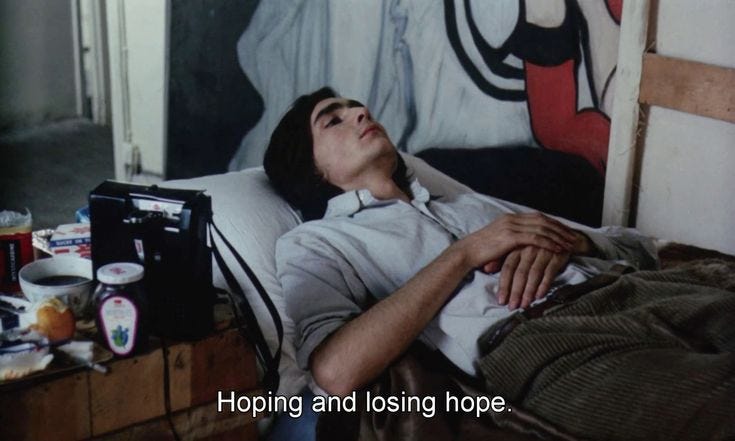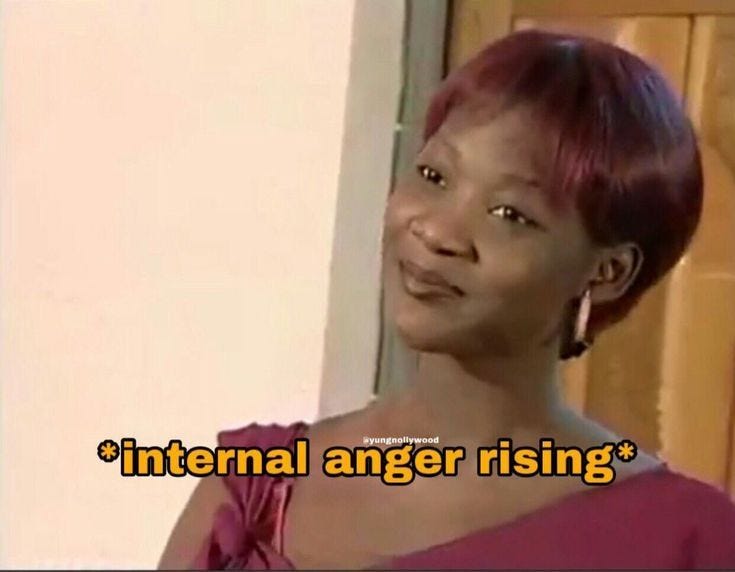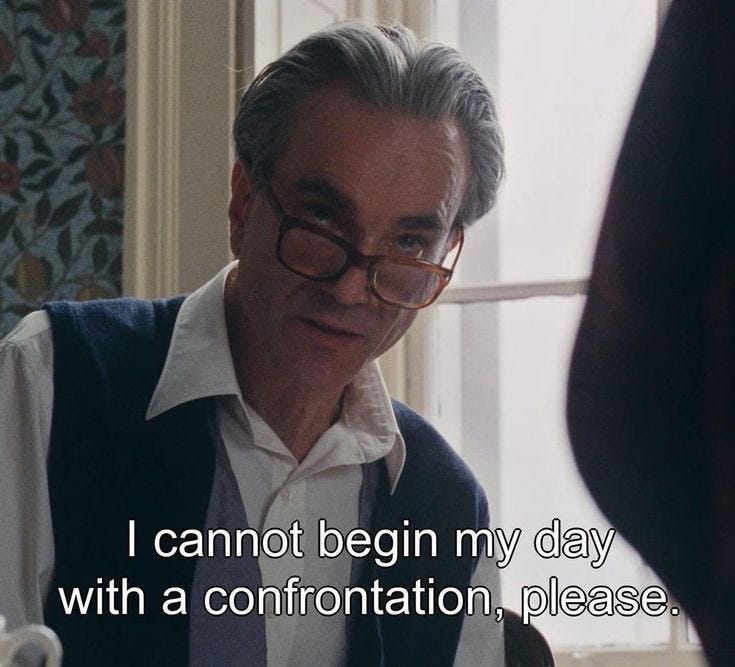what if you're not one of the good ones?
the illusion of redemption in a performative world
I’ve never cared for the idea of heaven or hell. The threat of eternal suffering stirs only diluted panic, leaving me more exhausted than motivated. The binary of good versus bad, damned versus saved, feels overly simplistic. Instead, I think of purgatory—a liminal space forcing us to confront ourselves directly. To me, that is true condemnation. Who would willingly choose to face themselves and their sins in their entirety? Not bad enough for eternal suffering but not pure enough for reward.
Some would say life is a good enough introduction to purgatory as long as you’re self-aware enough. The rigid binaries of good and bad don’t align with the unpredictable and often murky nature of our everyday lives. However, the insistence on pigeonholing ourselves into these extremes can lead to skewed perceptions of ourselves. Depending on your relationship with religion or perhaps guilt and absolution, you either think you're too good or not good enough.
This misalignment affects more than just our personal lives; it infiltrates how we perceive our privileges, often making them easier to dismiss than to confront and accept. It’s a trait often seen or described best in the media we consume. For example, in The Hunger Games, we can see a microcosm of this dissonance in action. The best analogy I can think of to explain what I mean is the following: If we were to ask most people we know who they would realistically be in the Hunger Games universe, they would pick wrong. The key to this question is not who they aspire to be or who they admire but whose life they currently reflect. Everybody wants to be Katniss Everdeen, a character who suffers and triumphs against the odds, but not many want to admit they would either be in the Capitol or Districts 1 or 2, complicit in the exploitation and oppression of the very characters they love while reaping the benefits.
The ease with which we dismiss our privileges under scrutiny is a fascinating symptom of a growing cognitive dissonance I’ve noticed accelerating since around 2020, after the murder of George Floyd. As a global community, many of us have become infinitely more compassionate, able to critique our systems—judicial, fiscal, and social—and instrument critical change. But we are still falling victim to our conditioning. When tasked with approaching a problem en masse, we excel, but when asked to examine how we, as individuals, the people who make up the very classes and groups we must change, we falter miserably.
Although we’ve shown a greater interest in implementing change, the effort on a personal level can feel performative, especially when confronted with actions for good that may cause personal inconvenience. Take, for example, people’s reluctance to engage in boycotting to protest the simultaneous genocides happening across the globe. How hard is it really to forgo your regular Starbucks trip for an alternative? Of course, there are many companies on the boycott lists, and for some consumers, they may be unavoidable, especially if you live in a food desert. But if you’re like me, living comfortably in a metropolitan city, we could all stand to make more of an effort. I don’t say this without criticising myself; I have typed every single one of my essays on this MacBook while Apple is currently involved in a lawsuit with DR Congo over the use of conflict minerals. Apple says it is “deeply committed to the responsible sourcing of minerals” and, as of last year, has suspended all ties to Congo. But if this were not the case, I don’t imagine those suffering at the hands of illegal mining and abuse would look at me any differently or blame me any less if they knew I was boycotting Starbucks and other named brands.
Here, our cognitive dissonance—knowing our complicity but struggling to act on it—mirrors themes in popular media. It’s this context that makes the Hunger Games analogy so apt.
This phenomenon isn’t only represented in fiction. Take, for example, the recent events in Lagos, Nigeria, at the NATIVELAND festival. One girl’s timely response highlighted to me just how quickly people are willing to distance themselves from the systems they benefit from.
In a tragic turn of events, the stage collapsed as ODUMODUBLACK was set to perform. A similar thing happened when I was there in 2019. The majority of the outrage was targeted toward the event organisers, which, in my opinion, is apt as they are responsible for their guests. However, there was one take I saw on a girl’s story; she was associated with NATIVE MAG in some way, I believe. There had been previous snaps of her backstage and with a company tag. She believed that it was the guests’ fault—they should have controlled themselves instead of overcrowding the stage, which, in her opinion, led to the collapse. It was symptomatic of Lagos culture, and they should have known better.
The first thing I thought of was that her quickness to express an opinion was an attempt to shift any guilt she had amassed. This was a classic case of virtue signalling and posturing. This instinct to absolve ourselves of complicity is at the core of system justification, a psychological process in which individuals rationalise the status quo—even when it fails them. In reality, while crowds in Lagos tend to be on the boisterous side, Lagos event planners have a history of complacency and a general lack of organisation.
By shifting the blame to the guests, this girl rationalises NATIVEMAG’s behaviour and historical lack of safety considerations, thus absolving their systemic failings seen across multiple instances—e.g. lack of adequate infrastructure, security, or predictability. I believe that, in her way, this was her attempt at distancing herself from the very event she had been previously seemingly proud to have attended. By expressing her disapproval, she tried to signal her innocence. Unfortunately, her anger was misdirected.

Our compulsion to distance ourselves from the very systems that made us often leads to The Oppression Olympics—a competition to prove whose suffering is the most valid. As I explained to someone last night, the existence of people above you does not mean you're at the bottom. It leads me to discussions I’ve been having about the transitive nature of status—something I recognise and think of frequently as a Nigerian who has lived in multiple countries, including Nigeria.
If you’ve read my other essays, like girlhood felt like an exclusive members' club, you’d know about my experience with racism in the West. I have never thought of myself as less than or lower because of it, but I am aware of how I am viewed by people in the UK or elsewhere. They may think of me differently, and that’s their business, but it’s influenced my life to varying degrees. ( In this instance, I’m talking about race specifically, it doesn’t lessen my other privileges in any way, only makes interactions different). Now, when I’m back in Nigeria, this is not my reality. It would be dishonest and do me no favours if I couldn’t admit to myself that as a Nigerian in Nigeria, I am extremely privileged. My parents and their extended family have mostly all been educated abroad, lived abroad at some point, and still travel frequently. I don’t have to think about most menial things while I’m there, and while it’s fun and commonplace to complain when NEPA takes light and we have to switch to the generator, it’s more than just good fortune that my father also has solar. All of this seems normal growing up, and it may seem normal to you, but in reality, just like you could say about the UK in different ways, there are serious problems in the country—some of which I will never be affected by.
I use the awareness of my privilege to motivate myself to do better, and I try to do so in an authentic manner. Most of what I would consider my ‘activism’ is carried out ‘offline,’ whether this be through the facilitation of charities or volunteering when I’m back home. I’ve noticed, however, that when certain social groups are introduced to the idea of their privilege, the guilt motivates them to discard that part of themselves. We’ve seen many a case of this with the sudden wave of white liberals on TikTok being exposed for secretly being a bigot.

In addition, I think we have convinced ourselves that participation online carries more weight than in-person participation, and it’s moral licensing at its finest. Just as system justification explains our collective denial, moral licensing reveals why individual actions often fail to align with larger ethical goals. Just like in 2020, we have convinced ourselves that a repost or a like qualifies as sufficient help for those suffering incomprehensible atrocities. In my opinion, the label ‘activist’ has been degraded to a status symbol of sorts, with people forging internet careers out of performed interest in certain causes.
I mean, we had TikTok edits made comparing the genocide in Gaza and the protests to scenes from the Hunger Games movies. Everyone is quicker to identify with the oppressed. By doing so, they can distance themselves from the horrors of a harmful system, even when their lifestyles align more closely to benefiting from it. We praise our ability to enact basic empathy, following survivors in Gaza, briefly indulging the feelings of sadness when we see the news, and awarding ourselves a sense of moral righteousness. It’s this same ‘award’ that emboldens us to make poorer decisions. The hope is that by identifying with the suffering, we can adopt their struggles symbolically and divert attention from our participation.
Moral licensing is a cognitive bias where prior good behaviour leads individuals to permit themselves to engage in morally questionable actions without threatening their self-image as a moral person.
Whether it’s distancing ourselves from tragedy or imagining ourselves as the victims, these behaviours reveal a deeper struggle: the refusal to confront our role in a broken system. Ultimately, these biases—our desire to appear virtuous, especially to others—keep us trapped in cycles of superficial engagement while systemic issues persist. Just like our prioritisation of online activism is partially because we want to look like we care, while it often does little for the subjects of the cause. In a way, this prioritisation is inherently a form of system justification. While government officials and permanently insulted right-wing fanatics might drum up noise about the overzealous Gen Z on TikTok, they’d rather we stick to it. The longer we commit to things that have no solid impact, the longer they deem it fit to continue.
So, in our way, we are living in a kind of purgatory - trapped between our awareness of the systems we reap and our inability to confront them. We know we could do better, and yet we refuse. We justify our inability to mobilise by disregarding our privilege and playing dress up with oppression and marginalisation. Purgatory is an opportunity to confront ourselves as we truly are: imperfect and often enablers. These moments of dissonance present a worthwhile challenge: deal with the uncomfortable truth and embrace it. In turn, we should do the hard work and change for the better. Until we can succumb to this, we remain in purgatory, suspended in a painful cycle of guilt and shame, intermitted by fickle attempts of redemption.
Hola, happy new year !! Hope you guys have been enjoying the holidays, whether or not you celebrate Christmas or Hanukkah. Wanted to start the year of right, saw I thought I’d finish this essay for y’all. Let me know what you think as always, and I’ll be back next week.
Also thank you for the 1k+ subscribers.
Insta and other socials linked on my profile.








Lovely essay, it really made me think about how my ability to just acknowledge my privileges might not be enough or the the amazing work I think it is.
Thank you for this essay!
Truly encapsulated that unsettling feeling I could never properly articulate. When scrolling through posts of what appears to be fanatic support for the oppressed while somehow reaping benefit from the same system they seem to oppose. But also directed at myself as a part ethnic Palestinian who grapples with guilt over an objectively privileged life style.
The purgatory is something that will be circling in my thoughts for quite some time now!